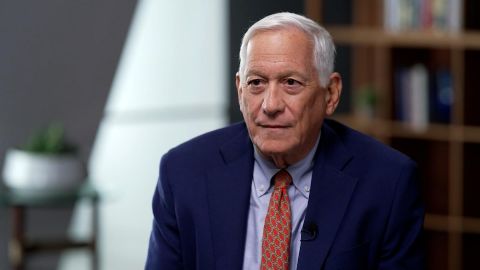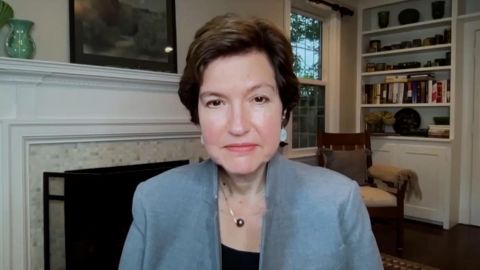Read Transcript EXPAND
CHRISTIANE AMANPOUR, CHIEF INTERNATIONAL ANCHOR: Walter Isaacson, welcome —
WALTER ISAACSON, AUTHOR, “ELON MUSK”: Thank you, Christiane.
AMANPOUR: — to our program. So, here you are authoring yet another genius biographer.
ISAACSON: Indeed.
AMANPOUR: What is it about Elon Musk that really peaked your imagination for this?
ISAACSON: Well, when I first started, he was the only person able to get American astronauts into orbit ever since the space shuttle has been decommissioned and he was doing more than anybody to bring us into the era of electric vehicles, to create batteries, to create solar roofs. So, I thought he was doing these epic missions. Of course, in the middle, after a year or so of reporting, he decides to quietly start buying Twitter. So, it became much more of a roller coaster ride. It also revealed both the drives that come in his head, but the demons that are sometimes dark and sometimes he can channel into drives.
AMANPOUR: What did you go in thinking about him and what did you emerge?
ISAACSON: I thought at first that he was a technologist who had a really good feel for manufacturing, how to make factories. Also, that he was a risk-taker. And then, in this country, in fact, in all of the West. We used to be more of a risk-taker, you know, everybody who came to the United States came — whether the Mayflower across River Grand taking some risks. But now, we have more referees than we have risk-takers. You know, we have more lawyers and regulators than we have innovators. And so, I thought, OK, he’s push things forward. But I also got to see that that can be kind of dark at times, that it can break things. It can blow-up rockets. And then, of course, it can really disrupt Twitter. So, it’s about — it’s a story about somebody who’s a tightly woven fabric of light and dark strains.
AMANPOUR: And I wonder whether it’s — you know, you talk about referees, but one of the critics of — critique of Musk is that he is such a powerful private wealthy individual that he can just walk around the world making policy, you know, replacing NASA, replacing the internet. Having a real role in active war like in, you know, our internet generation in Ukraine. I need to ask you because it’s in the news.
ISAACSON: Yes.
AMANPOUR: How do you explain this discrepancy regarding the Starlink and activation over the Ukraine attempt told take the war to Crimea in the early days? You said one thing in your book that he turned it off and he says another thing, and you’ve had to walk it back. How does that happen?
ISAACSON: Well, I’ve talked to him about that. That night, when it was happening in September, he said to me, hey, we disabled — we’re not enabling this attack because it could start World War III. It was very apocalyptic. Says, we’re not going to let them use Starlink to do the sneak attack there. And I made the mistake of thinking he meant that night he turned it off. And later he said, no, it had already been disabled but the Ukrainians, all of the text messages are in the book, they’re amazing, were trying to get him to enable it. Because they did not know he had it disabled. And so, I made a mistake in thinking that the decision to disable it was made that night, it had been made before then. It’s called geofencing. But still the main thing was he got to decide that night, do the Ukrainians get to do this attack or not do this attack. So, it doesn’t affect that. And it doesn’t even affect the larger question is, how come he got to decide? Why is a private citizen deciding whether or not —
AMANPOUR: Well, that was my question.
ISAACSON: — the Ukrainians can do it?
AMANPOUR: How is that even possible? Does that trouble you about somebody like Musk?
ISAACSON: Well, I think it even troubled Musk after a while because he talks to General Mark Milley of the Joint Chiefs of Staff, talks to Jake Sullivan, the national security adviser, and they work out a deal where SpaceX, Musk’s company, will sell some of these satellites to the U.S. military and the U.S.military gets to decide. And that’s really the way it should be. But there’s a larger question here, which is, how come, when the Russians attacked Ukraine, all of the U.S. military satellites via sat, everybody else doing communications gets knocked out, and the only person in the world who has a communication system that can work is Musk? And it’s still the case. And part of the reason is we don’t build these things well as we should.
AMANPOUR: So, that’s a lesson for American technology and business and science.
ISAACSON: Absolutely. NASA, the defense agencies, they should not have to depend on one company. Do you know that all communications, big, big communication satellite, even for our intelligence agencies that have to go into high earth orbit, they’re done by SpaceX? They launch it. Because NASA and Boeing have become somewhat sporadic.
AMANPOUR: And what about, even this week, as he meets with Kim Jong Un, President Putin praised Musk, great American businessman, a great citizen of the world, does that bother Musk this, you know, act of imperialistic aggression, as it’s being described, you know, he’s talking to the aggressors and maybe getting a little bit of context for his Starlink availability from what the Russians say, this idea of starting World War III? Is that really a concern right now?
ISAACSON: Well, Musk have somewhat of an apocalyptic vision, as he often does, of what can happen. And he talked to the Russian ambassador. The thing though to remember is when Russia invades Ukraine, that night, Ukraine has no way to communicate with its troops, via sat, all of the other satellites out. The only other way to communicate would be Starlink and Musk rushes hundreds and then thousands of Starlink terminals over there for free, as a donation. So, he’s supporting the Ukrainians. But at a certain point, he says to me, how did I get into this war? You know, I didn’t mean for this to be useful offensive purposes.
About This Episode EXPAND
Age has become an issue for the 2024 election — not just for presidential candidates, but also in Congress. Sen. Mitt Romney, 76, announced he will not be seeking re-election in 2024. He strongly urged President Biden and former President Trump also to step aside . Susan Glasser’s latest article for the New Yorker is called “The Twilight of Mitch McConnell and the Spectre of 2024.”
LEARN MORE

